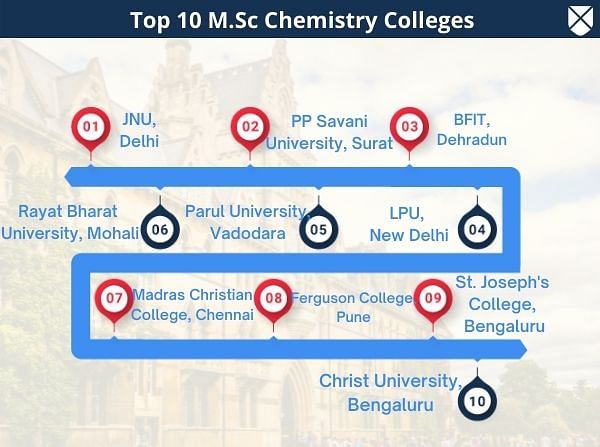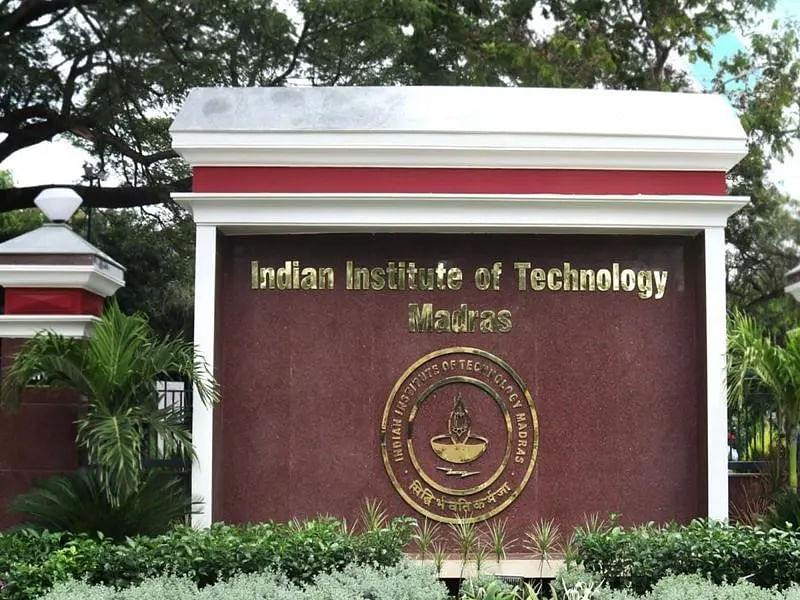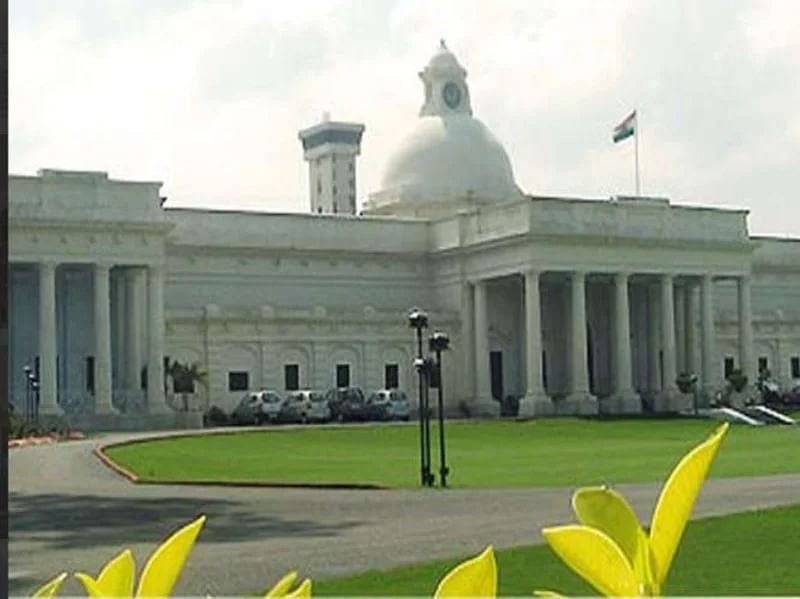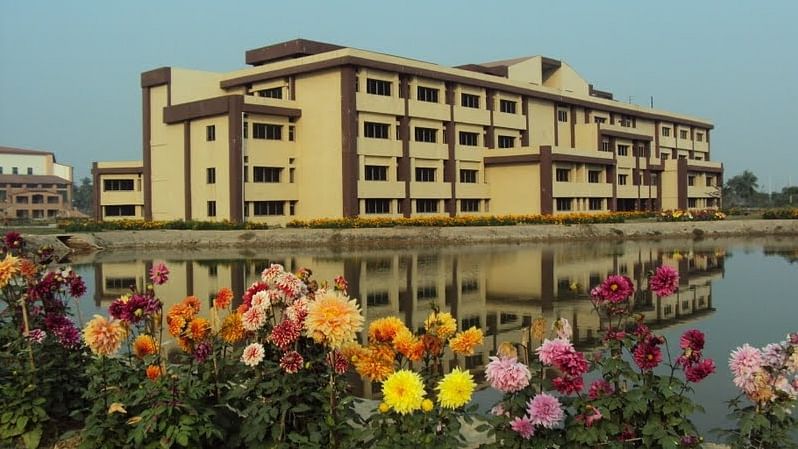M.Sc Chemistry: Course Details, Admission, Eligibility, Fees

M.Sc Chemistry is a 2 year-long postgraduate course that deals with the advanced studies of various areas in chemistry and its adjoining areas. After completing the course, graduates can work as Research Assistants, Scientists, lecturers, Medical writers, chemists, Quality Assurance Managers, etc.
Table of Contents
- About M.Sc Chemistry
- Eligibility Criteria For M.Sc Chemistry
- How To Get Admission to M.Sc Chemistry?
- Who Should Pursue an M.Sc Chemistry?
- Types of M.Sc Chemistry
- Popular Entrance Exams For M.Sc Chemistry
- Study M.Sc Chemistry in India
- Top 10 M.Sc Chemistry Colleges in India
- Fee Structure For M.Sc Chemistry
- Syllabus And Subjects For M.Sc Chemistry
- Why Choose M.Sc Chemistry?
- M.Sc Chemistry Course Comparison
- Preparation Tips For M.Sc Chemistry
- Scope For Higher Education
- Salary Of An M.Sc Chemistry Graduate
- Career Options After M.Sc Chemistry
- Skills That Make You The Best M.Sc Chemistry Graduate
M.Sc Chemistry Course Details
| Degree | Masters |
| Full Form | Master of Science in Chemistry |
| Duration | 2 Years |
| Age | No age limit |
| Subjects Required | Physics, Chemistry and Mathematics. |
| Minimum Percentage | 50% |
| Average Fees | ₹30K - 1 LPA |
| Similar Options of Study | M.Sc (Organic Chemistry), M.Sc (Biochemistry), M.Sc (Analytical Chemistry) |
| Average Salary | INR 4.5 LPA |
| Employment Roles | Data Scientist, Research Scientist, Chemistry Researcher, Chemist, Clinical Research Specialist, Lecturer, Laboratory Technician, Science Adviser, Toxicologist etc. |
| Top Recruiters | General Electric Co (GE), Biocon, Genpact, Dr. Reddy's Laboratories Ltd, Dettol Ltd., Detergent & Fertilizers, etc. |
About M.Sc Chemistry
The full form of M.Sc Chemistry is Master of Science in Chemistry. It deals with the composition, structure, and properties of substances. M.Sc Chemistry syllabus and subjects cover topics such as atomic particles, chemical reactions, bond structures, matters, creation of energy, etc. Since the M.Sc Chemistry job scope is really high, employment opportunities are available in both the public and private sectors.
Eligibility Criteria For M.Sc Chemistry
The basic Master of Science in Chemistry eligibility is completing the B.Sc degree with a minimum of 50% marks from a recognised board. Students must have had chemistry as one of the main subjects in their undergraduate course. There is no age limit for admissions into M.Sc Chemistry courses.
Apart from the basic merit eligibility of a B.Sc degree, certain M.Sc Chemistry colleges also conduct an entrance exam such as BITSAT, IPU CET, JNUEE, etc., to select the best suitable candidates.
How To Get Admission to M.Sc Chemistry?
For the M.Sc Chemistry admission process, students must ensure they satisfy the basic eligibility for the course. Along with the basic M.Sc Chemistry eligibility, students must also ensure a sound performance in the entrance-based selection process. The M.Sc Chemistry admission process can be based in two ways, either through merit or by appearing for an entrance exam.
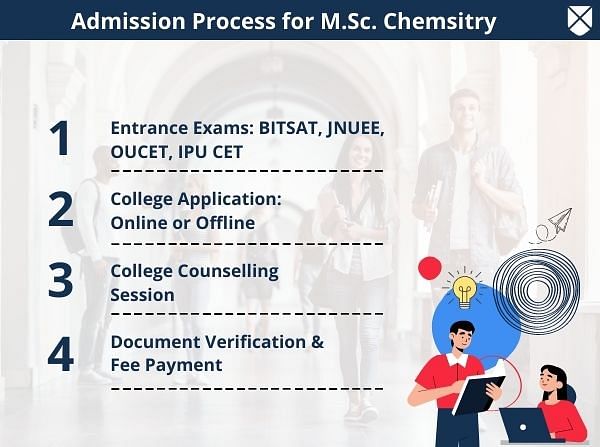
Mentioned below are admission procedure details in general:
How To Apply?
M.Sc Chemistry course details are available on the college websites through which the applicants can begin their registration process. The applications for M.Sc Chemistry admission are available to students through both online and offline modes. For the online process, students need to log in to the college website, fill out the details and make the registration payment online.
Regarding the offline mode, students are required to visit the college admissions office, collect the application, fill out the details and make the payment directly at the admissions counter. For both processes, candidates are required to provide valid documents regarding the verification process.
Selection Process
The M.Sc Chemistry admission can be based in two ways, either through merit or the candidate’s performance in the entrance examinations. The entrance exams are generally followed by a personal interview or a counselling session.
Who Should Pursue an M.Sc Chemistry?
Students interested in the In-depth study of inorganic, organic, and physical sciences, and research on atoms and molecules should pursue M.Sc Chemistry. Those who wish to pursue careers in Research, Pharma Companies, etc., can go for M.Sc Chemistry.
When To Do M.Sc Chemistry?
M.Sc Chemistry can be done right after graduation in B.Sc with Chemistry as one of the core subjects. It can also be pursued after a few years of working in the chemistry industry to advance a candidate’s career.
Types of M.Sc Chemistry
There are 3 modes of pursuing M.Sc Chemistry which is Full-Time, Part-Time and Distance M.Sc Chemistry. Details of all of them are given below:
Full-Time M.Sc Chemistry
It is a 2-year post-graduate course with classroom learning, classroom examinations and hands-on learning. The Full-Time M.Sc Chemistry is the most value-for-money course since it also involves interaction with experienced professors.
Part-Time M.Sc Chemistry
With a rise in demand for professionals, this course has been designed in a part-time mode too. People who cannot dedicate their complete time to pursuing M.Sc Chemistry can get admission and complete it at their own convenience.
Distance M.Sc Chemistry
IGNOU's School of Sciences offers a Remote M.Sc Chemistry to interested students in online and distance learning modes. A distance MSc in Chemistry can be completed in as little as two years and as much as five years. Students are given an extra three years to complete all of their exams.
Popular Entrance Exams For M.Sc Chemistry
Various top colleges for M.Sc Chemistry in India offer admissions strictly based on the candidate’s performance in the entrance exam process. Students must ensure timely preparation for the exams by critically analyzing the M.Sc Chemistry course details.
Mentioned here are some of the popular entrance exams conducted for selection for the M.Sc Chemistry degree:
A Quick Glance At The M.Sc Chemistry Entrance Exams
Candidates who wish to study M.Sc Chemistry must prepare for the entrance exams in advance. Mentioned here is the general pattern for the M.Sc Chemistry entrance exam:
- The duration of the exam is 180 mins
- Questions are objective in nature
- The paper is structured in an MCQ pattern
- There is a negative marking of -1 for each wrong attempt
- The mode of exam is online
Study M.Sc Chemistry in India
In recent years, there has been a surge in post-graduate colleges owing to Industry demand. M.Sc Chemistry Colleges have also been established all over the country to cater to that demand. Below are some cities and their top M.Sc Chemistry colleges:
Top 10 M.Sc Chemistry Colleges in India
Studying in the best college for M.Sc Chemistry in India ensures a detailed perspective for the student regarding the subject matter. Along with sound academic reading, the top colleges for M.Sc Chemistry in India also provide the best institutional facilities and exposure.
This ensures the student meets all the professional demands upon joining the job industry. Listed below are some of the best colleges for M.Sc Chemistry:
| Sl no. | Name of the Institute |
| 1. | JNU, New Delhi |
| 2. | PP Savani University, Surat |
| 3. | BFIT, Dehradun |
| 4. | Rayat Bahra University, Mohali |
| 5. | Parul University, Vadodara |
| 6. | LPU, New Delhi |
| 7. | Madras Christian College, Chennai |
| 8. | Fergusson College, Pune |
| 9. | St Joseph’s College, Bengaluru |
| 10. | Christ University, Bengaluru |
Top M.Sc Chemistry Colleges in New Delhi
Delhi, the capital of India is known for its world-class M.Sc Chemistry colleges. Check the table below for the top M.Sc Chemistry colleges in New Delhi:
| Sl.No | Institution |
| 1 | St. Stephen’s College |
| 2 | Hindu College |
| 3 | Miranda House |
| 4 | Hansraj College |
| 5 | Kirori Mal College |
Read More: M.Sc Chemistry Colleges in Delhi
Top M.Sc Chemistry Colleges in Pune
Pune, the educational capital of India, has a selection of premier M.Sc Chemistry Institutes. Check the table below for the top M.Sc Chemistry colleges in Pune:
| Sl.No | Institution |
| 1 | Bharati Vidyapeeth Deemed University |
| 2 | Savitribai Phule Pune University |
| 3 | Fergusson College |
| 4 | Abeda Inamdar Senior College |
| 5 | MITWPU |
Read More: M.Sc Chemistry Colleges in Pune
Top M.Sc Chemistry Colleges in Chennai
Chennai, Known for its vast coastline is also rich in M.Sc Chemistry colleges and is visited by students all over the country. Check the table below for the best M.Sc Chemistry colleges in Chennai:
| Sl.No | Institution |
| 1 | Ethiraj College for Women |
| 2 | Loyola College |
| 3 | Madras Christian College |
| 4 | Presidency College |
| 5 | Stella Maris College |
Read More: M.Sc Chemistry Colleges in Chennai
Top M.Sc Chemistry Colleges in Bangalore
Bangalore, the startup capital of India has an abundance of M.Sc Chemistry Colleges with top faculties and architecture. Check the table below for the best M.Sc Chemistry colleges in India:
| Sl.No | Institution |
| 1 | The Oxford College Of Science |
| 2 | Mount Carmel College |
| 3 | Christ University |
| 4 | Jain University |
| 5 | St Joseph's College |
Read More: M.Sc Chemistry Colleges in Bangalore
Top M.Sc Chemistry Colleges in Kolkata
Kolkata has some of the most famous and reputed colleges for M.Sc Chemistry courses in India. Check the table below for the best M.Sc Chemistry colleges in Kolkata:
| Sl.No | Institution |
| 1 | Lady Brabourne College |
| 2 | Calcutta University |
| 3 | Scottish Church College |
| 4 | Sister Nivedita University |
| 5 | Ramakrishna Mission Vivekananda Centenary College |
Read More: M.Sc Chemistry Colleges in Kolkata
Top M.Sc Chemistry Colleges in Hyderabad
Hyderabad is one of the most sought-after destinations when it comes to higher education, and its offerings of M.Sc Chemistry Institutes is no exception. Check the table below for the top M.Sc Chemistry colleges in Hyderabad:
| Sl.No | Institution |
| 1 | Nizam College |
| 2 | St Ann's College For Women |
| 3 | St Francis College For Women |
| 4 | Osmania University College For Women |
| 5 | GITAM Hyderabad |
Read More: M.Sc Chemistry Colleges in Hyderabad
Top M.Sc Chemistry Government Colleges
Government institutes for higher education provide high-quality affordable education to eligible candidates. There are lots of offerings when it comes to M.Sc Chemistry Government Colleges. Check the table below for the top M.Sc Chemistry government colleges in India:
| Sl.No | Institution |
| 1 | St. Stephen’s College, Delhi |
| 2 | Hindu College Delhi |
| 3 | Lady Shri Ram College For Women |
| 4 | Miranda House |
| 5 | Loyola College |
Top M.Sc Chemistry Private Colleges
With the emergence of a vast number of Private Institutes all over India, there has been a surge in M.Sc Chemistry institutes too. Check the table below for the top M.Sc Chemistry private colleges in India:
| Sl.No | Institution |
| 1 | Madras Christian College |
| 2 | Fergusson College, Pune |
| 3 | St. Xaviers College (SXC) Kolkata |
| 4 | St. Xavier's College Mumbai |
| 5 | Ramakrishna Mission Vivekananda Centenary College |
Fee Structure For M.Sc Chemistry
The M.Sc Chemistry fees of a college depend on a wide range of underlying factors. Some of the governing factors that impact the fee structure of an M.Sc Chemistry degree include the infrastructure of the college, institutional facilities, faculty, lab facilities, placement opportunities ,etc.
The average fee range for a Master of Science in Chemistry in India is INR 30,000 - 1 LPA. Mentioned below are some of the various M.Sc Chemistry colleges and their fee structure:
| Sl. No. | Name of the Institute | Fee Structure |
| 1. | Women’s Christian College, Chennai | INR 52,000 PA |
| 2. | Indian Institute of Technology, Mumbai | INR 87,000 PA |
| 3. | Dr. MGR Educational and Research Institute, Chennai | INR 88,000 PA |
| 4. | Maharishi Markandeshwar University, Ambala | INR 1 LPA |
| 5. | Silver Oak University, Ahmedabad | INR 96,000 PA |
| 6. | Chandigarh University, Chandigarh | INR 1.3 LPA |
Syllabus And Subjects For M.Sc Chemistry
The syllabus for the Master of Science in Chemistry is divided into 4 semesters over a 2-year long period. It is a postgraduate program specializing in the fields of chemistry and its adjoining concepts. The areas of study in the syllabus include organic chemistry, physical chemistry, chain reactions, analytical chemistry, etc.
Mentioned below are some of the core subjects taught in the syllabus for the Master of Science in Chemistry:
- Inorganic Semimicro
- Bioanalytical Chemistry
- Group Theory
- Reaction Mechanism
- Inorganic Rings, Clusters and Chains
- Medicinal Chemistry
- Physical Chemistry
- Pericyclic Reactions
- Coordination Chemistry
Read More: M.Sc Chemistry Syllabus and Subjects
Why Choose M.Sc Chemistry?
Technological and medical research advancement in recent decades has opened up lots of prospective opportunities for the graduates of the M.Sc Chemistry course duration. To understand the questions ‘Why choose M.Sc Chemistry?’ and ‘What is M.Sc Chemistry?’ better, we can make them simpler by breaking them down into the next three questions:
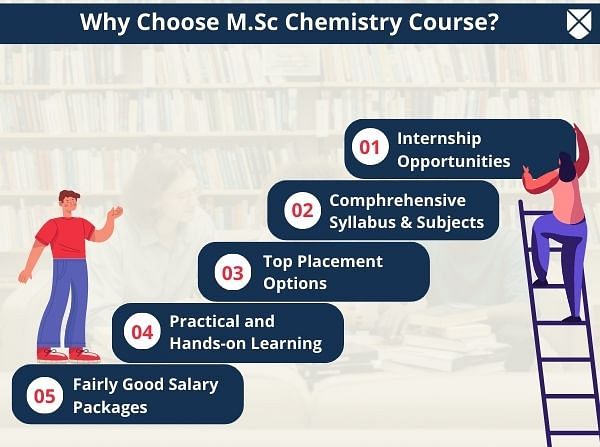
What Is M.Sc Chemistry All About?
M.Sc Chemistry is a 2 year-long postgraduate course specializing in the subject matter of chemistry and its adjoining areas. M.Sc Chemistry full form translates to Master of Science in Chemistry. Job roles after M.Sc Chemistry degree include Chemist, Lecturer, Research Associate, Quality Assurance Manager, etc..
What Does An M.Sc Chemistry Graduate Do?
M.Sc Chemistry can be a gateway to a fulfilling career for graduates who want to pursue specializations in the field of healthcare, medical research and business, corporate lab research, etc.There is a wide range of opportunities available to graduates of the course depending on their area of interest.
Chemist: The job description of a chemist includes performing tests as a part of research projects and developing new methods. The job role also includes writing technical reports in order to better explain the chemical developments. They submit their reports to other professionals in the field such as engineers and scientists.
Reasons Why M.Sc Chemistry Can Fetch You A Rewarding Career?
Advanced medical research and technological development in the last few decades have enabled the field of chemistry to expand to a wide variety of sectors. A variety of opportunities are available after the M.Sc Chemistry degree in the field of medical research, quality assurance, medical supervising, public relations, etc..
Diversity of Job Roles: The field of chemistry is very diverse offering job opportunities in a wide range of fields. From Warehouse Supervisor, Quality Assurance Manager, and Lecturer to Medical Writer, the field has immersed a diversity of employment areas. Depending upon the interest and the specialization of the individual, they can opt for the profession of their choice.
Read More: M.Sc Chemistry Job Opportunities and Scope
M.Sc Chemistry Course Comparison
M.Sc Chemistry stands for Master of Science in Chemistry and is typically catered to students interested in and inclined towards Organic, Inorganic and Physical Chemistry. Below is a comparison of the M.Sc Chemistry course with other courses:
M.Sc Chemistry vs M.Sc Medicinal Chemistry
The table below showcases the differences between M.Sc Chemistry and M.Sc Medicinal Chemistry:
| Course | M.Sc Chemistry | M.Sc Medicinal Chemistry |
| Full-Form | Master of Science in Chemistry | Master of Science Medicinal Chemistry |
| Stream | Masters | Masters |
| Course Duration | 2 years | 2 years |
| Eligibility | BSc degree with at least 50% with Chemistry as one of the main subjects. | B.Sc in Medicinal Chemistry with a minimum of 55% from any recognized university. |
| Entrance Exams | JNUEE, IPU CET, BHU PET, DUET, etc | JNUEE, IPU CET, BHU PET, DUET, etc |
| Top Colleges | Hindu College, Miranda House, Hansraj College, etc | SPPU, Pune, GGSIPU New Delhi, Pacific University, Udaipur, etc |
| Fees | INR 20,000 to INR 2 LPA | INR 5,500- INR 2 LPA |
Preparation Tips For M.Sc Chemistry
Taking into account the course details, students should be well prepared with the different aspects of the syllabus. Timely preparation ensures an in-depth understanding of the course along with developing a critical understanding of the subject matter. Some preparation tips for M.Sc Chemistry are mentioned below:
Time Management: Time management becomes extremely crucial to cope with the lengthy syllabus during the 2 year period.
Regular Practice: Regular practising of the concepts of the course helps in better understanding the various tenets of the syllabus.
Mock Practice: Students should indulge in mock practice so as to develop a problem-solving approach regarding problem situations.
Scope For Higher Education
M.Sc Chemistry degree not only ensures lucrative career opportunities but also opens up doors for various higher education opportunities. Higher education after M.Sc Chemistry enables one to impart a higher degree of knowledge and industry skills.
A higher degree of skill set ensures a higher starting salary upon joining the work industry. Mentioned below are some of the higher educational courses after M.Sc Chemistry:
Salary Of An M.Sc Chemistry Graduate
The salary of an individual after an M.Sc Chemistry course duration depends on a varying range of factors. Some of the governing factors include experience, expertise, specialization, skillset etc. Higher education and research courses after M.Sc Chemistry also ensure a higher degree on the pay scale. As of now, the average salary of an M.Sc Chemistry degree graduate is INR 4.9 LPA (Source: Payscale).
Read More: M.Sc Chemistry Salary
Career Options After M.Sc Chemistry
While conducting research into the M.Sc Chemistry course details, students should also look into the various career opportunities available after graduation. Graduates of the field can opt for the teaching profession and continue with their research in the field of work for various private companies.
The job scope for M.Sc Chemistry is also available in various areas of the government and private sector. Mentioned below are some of the career options available to students after graduation:
- Chemist
- Teacher
- Research Associate
- Medical Writer
- Toxicologist
- Warehouse Supervisor
- Quality Assurance Manager
- Pharmaceutical Sales Executive
- Lab Assistant
- Clinical Research Associate
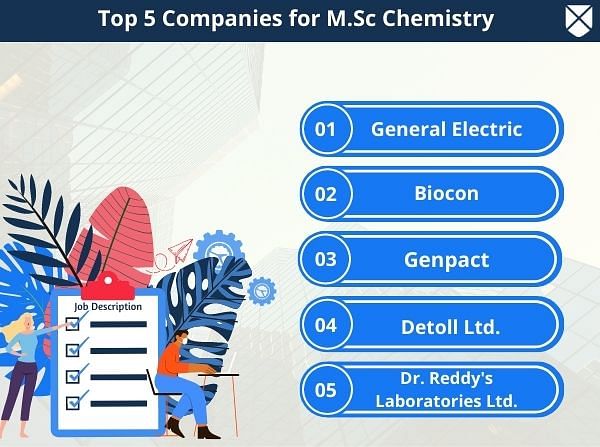
Skills That Make You The Best M.Sc Chemistry Graduate
M.Sc Chemistry course demands a detailed study of the course for students to develop a critical understanding of the concepts. Along with possessing academic understanding, students also need to have a particular set of skills in their baggage to become experts in their field. Some of the skills are listed below:
- Quality Assurance
- Deductive Reasoning
- Drug Formulation
- Problem Solving Approach
- Excellent Communication Skills
- Multitasking
- Critical Thinking
Top M.Sc Chemistry Colleges
Top Science Entrance Exams
M.Sc Chemistry Fee Structure
FAQs on M.Sc Chemistry
Q: What is the scope of MSc chemistry?
Q: What are the subjects in MSc chemistry?
Q: What is the age limit for M.Sc chemistry?
Q: What is the salary after MSc chemistry?
Q: What is the best chemistry for an MSc?
